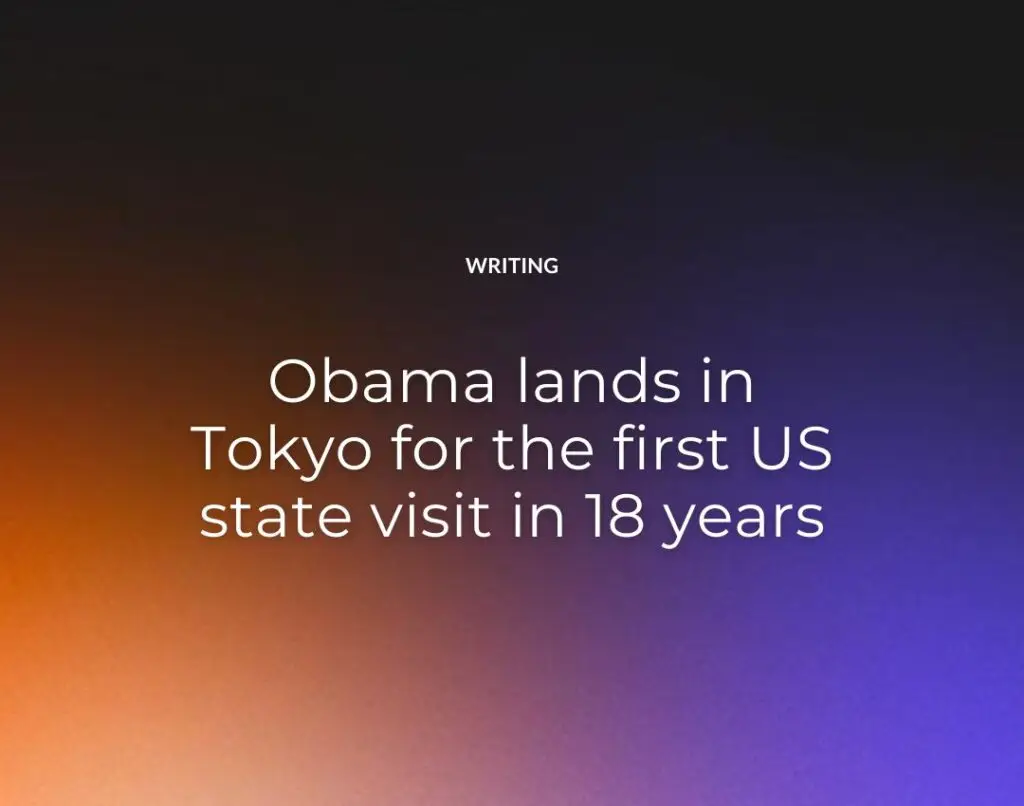By Geoffrey Cain
PRI’s The World
Apr 23, 2014
SEOUL, South Korea — Japan is without a doubt America’s most stable and prosperous ally in East Asia. Yet today, President Barack Obama became the first American president since Bill Clinton in April 1996 to visit the country as a state guest.
Analysts say his visit is long overdue.
He arrives at a time of rapidly escalating tensions in the region. China is asserting ever-more bold claims to territories hundreds and even thousands of miles from its coasts, in the South China Sea. A pugnacious North Korea appears prepared to move forward with a fourth nuclear test. Meanwhile, South Korea and Japan — two countries that are supposed to be friendly — have spent the past year bickering over historical grievances, hurting efforts for a unified Asian front against both of these security threats.
So Obama’s to-do list is long, said Sean King, senior vice president at the consulting firm Park Strategies in New York. The president must reassure an increasingly nationalistic Japan of Washington’s commitments under the two nations’ long-standing mutual defense treaty. He must forge unity between Seoul and Tokyo over Pyongyang and Beijing. And to please powerful interests back home, he needs to work out thorny issues in a landmark regional trade deal called the Trans-Pacific Partnership (TPP).
Obama’s diplomacy embraced controversy even before he landed in Tokyo. On Wednesday, Japan’s Yomiuri newspaper ran an interview with the American president, who explained that under their mutual defense treaty, the US is obligated to defend Japan over the disputed Senkaku Islands (known as Diaoyu to Beijing), which Japan controls. Although he didn’t specifically name China as the likely aggressor, Beijing reacted forcefully to the announcement.
“The policy of the United States is clear — the Senkaku islands are administered by Japan and therefore fall within the scope of … the US-Japan Treaty of Mutual Cooperation and Security,” Obama told the newspaper.
After Japan, the commander-in-chief will head to South Korea and the Philippines, two other historic allies, and to Malaysia, an outlier in the Asia pivot.
Japan has endured tumultuous times since President Clinton’s 1996 visit. Back then, Japan was a nation in the middle of a lost decade (or more) of economic lethargy. It was attempting to recover from the dual blows of a massive earthquake in Kobe and a sarin gas attack perpetrated by a cult in the Tokyo subway. It was also contending with political gridlock and an aging population.
Today, although Japan is still recovering from the devastating March 2011 earthquake, tsunami and nuclear disaster at Fukushima, the country is showing signs of rebound at home. And with China’s rapid rise as a military and economic power, the country is increasingly important strategically to the US.
Here are four key ways Japan has changed since President Clinton’s visit.
1. There are ‘green shoots’ of revival
Last year, Prime Minister Shinzo Abe embarked on a bold but controversial plan called Abenomics, a three-pronged strategy of cheap credit, government stimulus, and regulatory reforms. His pledge? To break through the gridlock of the past, reinvigorating lethargic markets and ending Japan’s two-decade torpor.
Japan watchers still disagree over whether Abenomics is working; free-market advocates accused him of going soft on his politically difficult “third arrow” of regulatory reform, which could have included better incentives for women to join the workforce and a relaxation of the country’s notoriously complex immigration rules.
Regardless of the outcome, Japan’s national consciousness could be in the middle of a transformation, says one expert.
“While the record of Abenomics policies is still up in the air, Abe’s rhetoric has done something profound: it has given decision-makers, CEOs, and others the ‘space’ to have a new conversation in the workplace about increased opportunities for women and hope that change is possible,” said Devin Stewart, a senior fellow at New York’s Carnegie Council for Ethics in International Affairs, who spent last month interviewing 40 CEOs, activists, and teachers. “Abe’s speeches and rhetoric are creating a new conversation.”
He called it “green shoots of change.”
2. China is an ever-growing threat
In 2009, President Obama opened his first term with a visit to China as part of an effort to rebuild American relations after President George W. Bush’s aggressive foreign policy and controversial military campaigns. But efforts to engage China have born little fruit. Instead, Obama’s “Asian pivot” — an effort to reassure Asians that they remain a top US priority — has felt to Beijing like just a Cold War-style containment strategy.
In fact, despite erstwhile idealism that the US could accommodate China’s rise, hopes have been dashed by Beijing’s growing aggressiveness over the South China Sea and by and the perception that the Chinese Communist Party’s authoritarian tactics are here to stay, regardless of the country’s growing economic prosperity and freedom.
Late last year, for example, China alarmed Japan, South Korea, and the US when it established an “air defense identification zone” covering the islands.
Abe rose to power on promises of pumping up Japan’s military brawn. The country’s pacifist constitution allows it to raise a peacetime defense force, not a standing army, but the prime minister appears eager to change that.
A rising China has invigorated Japan’s fringe right-wing nationalists, who are unapologetic over the nation’s history of war crimes against its neighbors.
Meanwhile, Abe angered Beijing just before Obama’s visit by sending an offering to the controversial Yasukuni Shrine, where the nation’s war dead, including various war criminals, are buried. China’s Xinhua news service called the move a “slap in the face of the leader of Japan’s closest ally.” Separately this week, a Shanghai court ordered the seizure of a Japanese ship over a failure to pay compensation stemming from a wartime contractual obligation.
3. The Fukushima disaster brought out the best in the Japanese
For all the tragedy and suffering, the 2011 Fukushima disaster brought out one of Japan’s greatest strengths: the passion and drive of its civil society to help its countrymen, according to a 2013 Brookings Institution report.
Japan’s anti-nuclear movement flourished, demanding better government regulations and more accountability. Citizens who lost everything sprung up to help one another, even when resources were tight and times were perilous.
The Fukushima disaster was so devastating that it altered attitudes in Japan. Many realized that the government was not a guarantor of stability and that the future is uncertain, explained Stewart, of the Carnegie Council.
4. The population is still aging, but a new generation of leaders is stepping up
Japan has its very own lost generation, commonly called its “Generation X” or “Junior Boomers” who were born after 1970 and fell through the cracks of stagnation in the 1990s and 2000s. Youth unemployment remains relatively high since then, with many young and productive job seekers squeezed out by a preponderance of aging salarymen.
Generation X was — and continues to be — derided as lazy and lackluster by elders. Now, they’re pushing those stereotypes aside, stepping into high-profile leadership positions in Japanese business and government, explains Stewart.
“Japan’s own Generation X is coming into positions of power and are able to implement change in organizations,” he said. “This generational change can help usher in greater women’s empowerment, more openness toward foreigners, and a stronger embrace of Japan’s history as positive example as opposed to a source of shame.”
Editor’s note: Due to a transcription error, previously, the final quote in the story read “…a stronger embrace of Japan’s history as positive example as opposed to a source of change.” We have corrected it to read shame.
The article was originally published in PRI’s The World
See Also:






